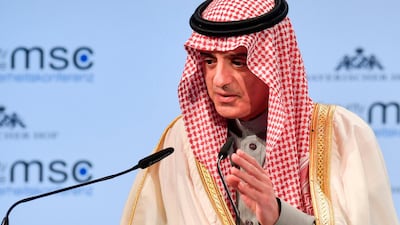The world must “extract a price” from Iran for its state-sponsored efforts to export the 1979 revolution, Saudi Arabia's foreign minister told a high-profile conference on Sunday.
This encompasses the spread of ballistic missiles, support for terrorists and a destructive impact on regional states through proxy forces.
Adel Al Jubeir welcomed efforts at the UN to pass a Security Council resolution condemning Iran for supplying ballistic missiles fired into his country by Houthi rebels in Yemen.
“We must have firmer positions with regards to ballistic missiles and with regards to Iran’s support for terrorism,” he said. “If Iran wants people to stop criticising it has to change its behaviour. It should stop sending weapons to the Houthis, sending terrorists to Syria.
“The world has to extract a price from Iran for its aggressive behaviour,” he said. “There has to be a fundamental change in the Iranian regime for Iran to be treated as a normal country.”
Iranian missiles were regularly used by Houthis "to target civilians in Yemen as well as inside Saudi Arabia”, Mr Al Jubeir said.
It also provided a haven for global terror groups. “Didn’t Iran train and manage the terrorist factions that bombed the Saudi Khobar Towers?”
The Saudi diplomat responded to a series of statements from his Iranian counterpart as both men made appearances at the Munich Security Conference. Mohammad Javad Zarif had said that the Middle East needed a new security framework to avoid "unnecessary rivalry".
In fact, under threat from a series of Iranian-backed groups in the Middle East, countries demanded that Iran repudiated that part of its constitution that mandated the export of the 1979 revolution beyond its borders, according to Saudi Arabia.
“The Khomeini revolution unleashed sectarianism in our region,” Mr Al Jubeir said. “Is Iran prepared to amend its constitution and not to export the revolution. We cannot afford to put up with the Khomeini revolution any longer.”
_______________
Read more:
UAE shoots down Houthi missile over Mocha, Yemen
_______________
Mr Al Jubeir welcomed the appointment of Martin Griffiths as the UN’s new peace envoy for Yemen, as a chance to find a new solution to the conflict. “I look forward to working with a new UN envoy on a political process,” he said. “I hope he can move Yemen to a new place.”
He took the opportunity to describe Saudi Arabia’s transformative plans under Vision 2030, which he said would modernise the nation in a way rivals like Iran have avoided.
“We are seeking in the process to make remarkable gains in our society,” he said. “As we move in this direction we become stronger, we become richer and we become less susceptible to the problems of our region."
Saudi diplomats have welcomed demands from President Donald Trump for efforts to address the flaws of the 2015 nuclear agreement. European allies have been wary of amending the deal to make it more stringent, but details of a new US approach to win their support emerged on Sunday in a State Department cable obtained by Reuters.
In return for Mr Trump keeping the deal alive by renewing the sanctions waiver when it next falls due in May, the US wants Europeans to commit to working together to "seek a supplemental or follow-on agreement that addresses Iran’s development or testing long-range missiles, ensures strong IAEA inspections, and fixes the flaws of the 'sunset clause'".
Mr Al Jubeir said that Iran had exploited the nuclear deal and failed to bring its potential benefits to its own population.
“There has been an increase in Iran’s nefarious activities. We haven’t seen a change in Tehran’s behaviour,” he said.
“The sunset provision needs to be eliminated,” he said. “The [deal] does not alone fix Iran’s malicious and aggressive behaviour.
“Iran needs to take care of its people. That’s why you saw the protests a few weeks ago.”
Mr Al Jubeir also accused Iran of sheltering Osama bin Laden’s son and the “entire board of directors” of Al Qaeda.
For his part Mr Zarif said a call from the US National Security Adviser HR McMaster on Saturday to stop investment and commercial deals with Iran because of the role of the Islamic Revolutionary Guard Corps in the economy amounted to a violation of the agreement.
Iran would not be renegotiating but would retaliate for any new sanctions, he said. “I can assure you that if Iran’s interests are not secured, Iran will respond, will respond seriously. And I believe it would be a response that means people would be sorry for taking the erroneous action they did.”
There was further pressure on the Iranian representative when Israeli Prime Minister Benjamin Netanyahu held up a tail fin of drone shot down last week inside Israeli airspace. “Mr Zarif, do you recognise this?” he asked. “You should, it’s yours.”
Mr Netanyahu also backed an overhaul of the agreement and its sanctions relief.
“[The deal] unleashed a dangerous Iranian tiger in our region and beyond,” he said.
John Kerry, the former US secretary of state, hosted a dinner for the architects of the agreement on Saturday night. He has strongly rejected criticism of its time-limited restrictions on Iran’s nuclear activities. “We know what the world looks like without the Iran nuclear agreement and it’s not a better place,” he said.

